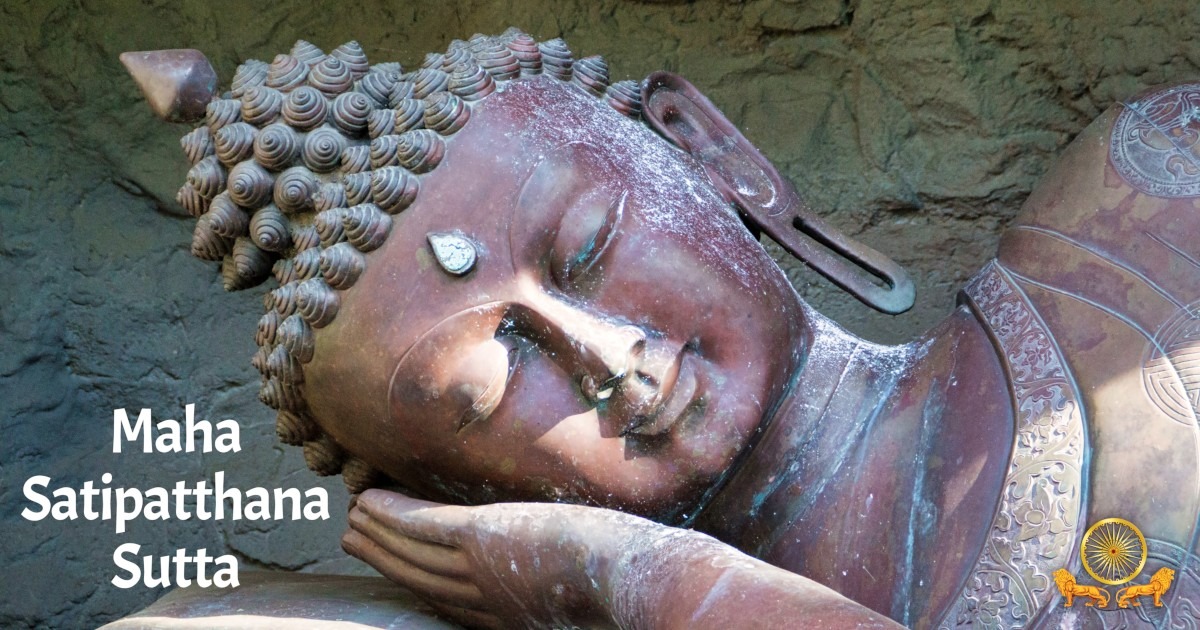3. Cittānupassanā:
Contemplation of Mind
Kathañca bhikkhave bhikkhu / citte cittānupassī viharati?/
“And how, monks, does a monk dwell contemplating mind in mind?
Idha bhikkhave bhikkhu / sarāgaṁ vā cittaṁ, sarāgaṁ cittanti pajānāti./
“Here monks, a monk understands a mind with lust as a mind with lust.
Vītarāgaṁ vā cittaṁ, vītarāgaṁ cittanti pajānāti./
He understands a mind without lust as a mind without lust.
Sadosaṁ vā cittaṁ, sadosaṁ cittanti pajānāti./
He understands a mind with hatred as a mind with hatred.
Vītadosaṁ vā cittaṁ, vītadosaṁ cittanti pajānāti./
He understands a mind without hatred as a mind without hatred.
Samohaṁ vā cittaṁ, samohaṁ cittanti pajānāti./
He understands a mind with delusion as a mind with delusion.
Vītamohaṁ vā cittaṁ, vītamohaṁ cittanti pajānāti./
He understands a mind without delusion as a mind without delusion.
Saṅkhittaṁ vā cittaṁ, saṅkhitta cittanti pajānāti./
He understands a contracted mind as contracted.
Vikkhittaṁ vā cittaṁ, vikkhittaṁ cittanti pajānāti./
He understands a distracted mind as distracted.
Mahaggataṁ vā cittaṁ, mahaggataṁ cittanti pajānāti./
He understands an exalted mind as exalted.
Amahaggataṁ vā cittaṁ, amahaggataṁ cittanti pajānāti./
He understands an unexalted mind as unexalted.
Sauttaraṁ vā cittaṁ, sauttaraṁ cittanti pajānāti./
He understands a surpassable mind as surpassable.
Anuttaraṁ vā cittaṁ, anuttaraṁ cittanti pajānāti./
He understands an unsurpassable mind as unsurpassable.
Samāhitaṁ vā cittaṁ, samāhitaṁ cittanti pajānāti./
He understands a concentrated mind as concentrated.
Asamāhitaṁ vā cittaṁ, asamāhitaṁ cittanti pajānāti./
He understands an unconcentrated mind as unconcentrated.
Vimuttaṁ vā cittaṁ, vimuttaṁ cittanti pajānāti./
He understands a liberated mind as liberated.
Avimuttaṁ vā cittaṁ, avimuttaṁ cittanti pajānāti./
And he understands an unliberated mind as unliberated.
Iti ajjhattaṁ vā citte cittānupassī viharati,/ bahiddhā vā citte cittānupassī viharati, /ajjhatta bahiddhā vā citte cittānupassī viharati./
“In this way he dwells contemplating mind in mind within himself, • he dwells contemplating mind in mind within another, • and he dwells contemplating mind in mind • both within himself and within another.
Samudaya dhammānupassī vā cittasmiṁ viharati,/ vaya dhammānupassī vā cittasmiṁ viharati / samudaya vaya dhammānupassī vā cittasmiṁ viharati./
“He dwells contemplating the arising of the mind, • he dwells contemplating the passing away of the mind, • and he dwells contemplating the arising and passing away of the mind.
Atthi cittanti vā panassa sati paccupaṭṭhitā hoti,/ yāvadeva ñāṇa mattāya patissati mattāya./ Anissito ca viharati./ Na ca kiñci loke upādiyati./
“Mindfulness, that there is a mind • is simply established in him • to the extent necessary for higher knowledge and mindfulness. He dwells independent, and not clinging to anything in the world.
Evampi kho bhikkhave bhikkhu / citte cittānupassī viharati./
That is how monks, a monk dwells contemplating mind in mind.
(The section on contemplating mind in mind is finished.)
- Uddeso: Introduction
- 1. Kāyānupassanā: The Observation of Body
- 1.1 Ānāpāna Pabbaṁ: Section on Breathing
- 1.2. Iriyāpatha Pabbaṁ: Section on Postures
- 1.3 Sampajañña Pabbaṁ: Section on Clear Comprehension
- 1.4 Paṭikūlamanasikāra Pabbaṁ: Section on Repulsiveness
- 1.5 Dhātumanasikāra Pabbaṁ: Reflections on the Elements
- 1.6 Navasīvathika Pabbaṁ: Nine Charnel-Ground Contemplations
- 2. Vedanānupassanā: Contemplation of Feeling
- 3. Cittānupassanā: Contemplation of Mind
- 4. Dhammānupassanā: Contemplation of Phenomena
- 4.1 Nīvaraṇa Pabbaṁ: Section on the Hindrances
- 4.2 Khandha Pabbaṁ: Section on the Aggregates
- 4.3 Āyatana Pabbaṁ: Section on the Sense Bases
- 4.4 Bojjhanga Pabbaṁ: Section on the Factors of Enlightenment
- 4.5 Sacca Pabbaṁ: Section on the Four Noble Truths
- Satipaṭṭhāna Bhāvanānisaṁso: The Results of the Establishing of Mindfulness

Learn how to purchase on the main book page.




















Leave A Comment